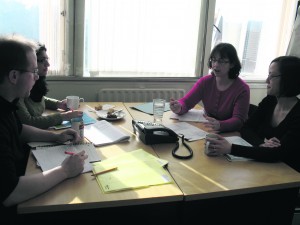SATURDAY, 7 MAY 2011
Caudex medical is a global medical communications agency, supporting pharmaceutical companies with their scientific communications. We provide writing and editorial support for papers, posters, presentations and websites. In addition we support the planning and running of meetings and congress activities, and work closely with international academic and clinical experts in a range of disease areas, coordinating their work in the development of new medicines with the pharmaceutical companies providing the funding. Medical communications may seem like a small field compared to research, but it has an important role in helping to bring new medicines to the patients who need them.What are your responsibilities within the company, and how do you spend your average working day?
As a medical writer my job has a focus on content generation, working on papers from clinical reports, and writing reports on scientific congresses and meetings. I also meet with clients and authors to discuss new or ongoing projects, mostly by teleconference, but there are some opportunities for travelling in person.
When reporting clinical trials, I work closely with the academics and medics who carried out the research to make sure their views are accurately represented. Negotiation skills can be important; there are often several parties with an interest in a piece of work, and their views may differ. The writer’s job is to try and find a solution that is acceptable to all parties. Work is frequently deadline-driven and it is important to stick to timelines and liaise with editors, commercial managers and others working on your account, to ensure that projects are finished on time and to the required specifications.
How did you get involved in medical writing?
I was working as a postdoc doing laboratory research when I started looking for a new job that would use my scientific background, but would not require relocating every few years. I started making enquiries about careers in industry as a regulatory writer, when two of the companies I was speaking to recommended that a year of experience with a contract research organisation or in medical communications could help my career. Having never heard of medical communications, I went away and investigated. Very quickly, I decided it sounded much more interesting than the jobs I had previously been looking at. I applied and was offered a trainee position with Caudex Medical soon after. I have not looked back since!
What is your favourite part of the job?
It is important to have a broad, detailed and up-to-date knowledge of the therapy area you are working on. I like staying on top of the science and getting to grips with new topic areas as you work with new clients. The fixed short-term goals and the associated sense of progress and achievement provide a satisfying contrast to life in academic research.
The office where I work has a friendly atmosphere that carries over into various social events and activities. I also like the fact that there always seems to be cake available in the office!
What advice would you give to young scientists hoping to get involved in medical writing?
While there are often jobs advertised for experienced medical writers, trainee places rarely seem to be offered. Do not wait to hope to see an advert, be proactive and contact the agency directly. Remember that you are applying to be a writer, so write a proper cover letter saying why you are interested in a career in medical communications, and send it along with your CV. “Why have you applied to us?” is a common interview question, so make sure you are well prepared. Not all agencies are the same—take time to find out as much as you can about the agency you are applying to. Look for an agency that will invest in training you, because this training will be the foundation of a successful career as a medical writer.
Andy Shepherd read Natural Sciences at Trinity Hall, completed a PhD in microbial genetics, then took a three-year postdoc before starting at Caudex. Andy was interviewed by Richard Thompson, a PhD student in the Department of Earth Sciences.

